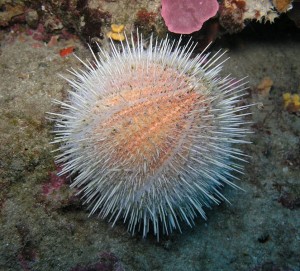BIOS Research May Unlock Cancer Mysteries
 The Bermuda Institute of Ocean Sciences [BIOS} is joining with researchers around the world to study sea urchins in a bid to better understand diseases like cancer, Alzheimer’s disease, Parkinson’s disease and muscular dystrophy.
The Bermuda Institute of Ocean Sciences [BIOS} is joining with researchers around the world to study sea urchins in a bid to better understand diseases like cancer, Alzheimer’s disease, Parkinson’s disease and muscular dystrophy.
BIOS was recently the beneficiary of a $3 million gift from a private trust to fund sea urchin research at its East End International Centre for Ocean and Human Health. The Bermuda research is also being funded in part by the US National Institutes for Health.
Although they are invertebrates, the creatures share a common ancestor with humans and have more than 7,000 of the same genes.
With a complete map of their DNA, scientists are learning how to treat and prevent diseases in humans better.
While sea urchins might not seem to have much in common with human beings — they are small and spiny, have no eyes, and eat only kelp and algae — a 2007 breakthrough revealed literally thousands of genetic similarities.
That’s when scientists with the Sea Urchin Genome Sequencing Project, also funded by the National Institutes of Health, completed sequencing of the genome.
They found that the sea urchin genome is very similar to that of humans, and may hold the key to preventing and curing several human diseases.
Sea urchins are echinoderms, marine animals that originated more than 540 million years ago. Sea urchin “roe” [actually the gonads that produce the creature's roe] are popular in Korean and Japanese cuisine, and is also a traditional food in Chile.
Beyond their culinary attractions, sea urchins are known for strong immune systems and long life spans; some can live up to 100 years
The project scientists are especially interested in how the sea urchin’s immune system works. Humans are born with innate immunity and also acquire additional immunities over time, as the body produces antibodies in response to infections.
Sea urchins only have innate immunity, with 10 to 20 times as many such genes than humans.
The hope is that studying sea urchins will provide a new set of antibiotic and antiviral compounds to fight various infectious diseases.
The genome of the purple sea urchin is comprised of 814 million “letters” that code for 23,300 genes.
Of those, it has 7,000 genes in common with humans, including genes associated with Parkinson’s, Alzheimer’s, and Huntington’s diseases, as well as muscular dystrophy.
Read More About
Category: All, Environment

